Tomb Sweeping Festival // 6 Things You NEED To Know About 清明节
Tomb Sweeping Festival | Your Complete Guide to Qingming Festival 清明节 in 2024
Every year on the 15th day after the Spring Equinox, Chinese people celebrate 清明节 (Qīngmíng jié) “Tomb Sweeping Festival”.
This is a day in which Chinese people pay respect to their ancestors.
- 清 qīng – clear, pure
- 明 míng – light, bright
- 节 jié – holiday, festival
The festival is celebrated every year on the 15th day after the Spring equinox, the 4th, 5th or 6th April, which is a national holiday.
In 2024, Qingming Festival will fall on April 4th.
Even though the festival has more than 2,500 years of history, it only became an official public holiday in China in the year 2008.
In order to observe 清明节 (qīngmíng jié) Chinese people go to the cemetery to honour, remember and celebrate the memory of their dead relatives and ancestors.
Find out everything you need to know about Tomb Sweeping Day in China 👇
Tomb Sweeping Festival | Origins
Tomb Sweeping Festival | The Ceremony
Tomb Sweeping Festival | Tomb Sweeping
Tomb Sweeping Festival | Family Outings
Tomb Sweeping Festival | Flying Kites
Tomb Sweeping Festival | Qingming Jie Today
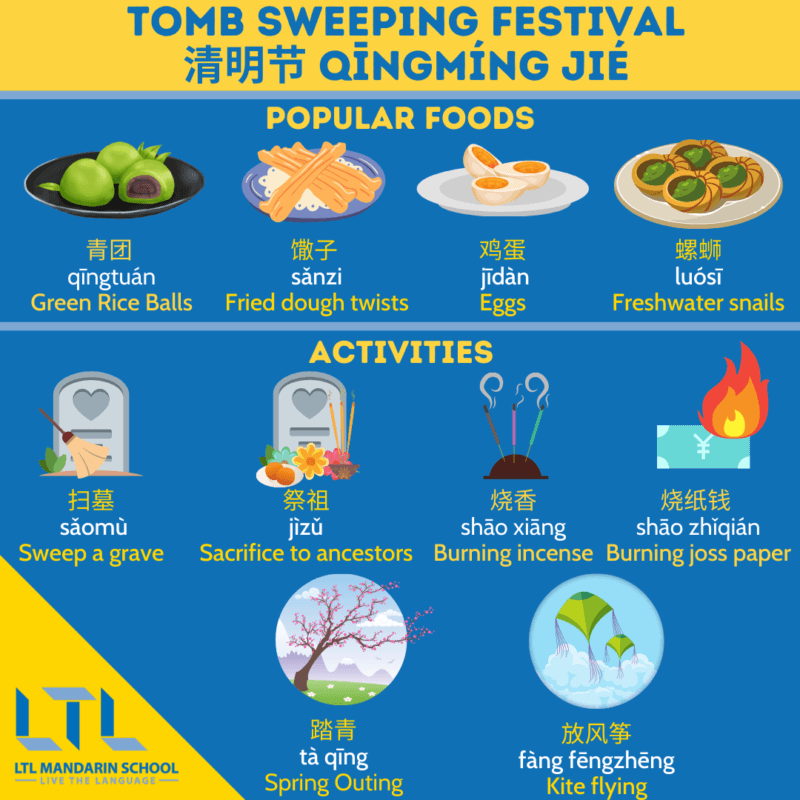
Tomb Sweeping Festival | The Origins
The Tomb Sweeping Festival has actually been celebrated for more than 2,500 years!
It is said that Qingming festival is celebrated to commemorate Jie Zitui, a man from the Spring and Autumn Period (770-476 BC).
Jie, a devoted follower of Duke Wen of Jin (one of the five hegemons of the Spring and Autumn period) cut a piece from his own leg to feed and save his master, who was at the time in starving in exile and known as Chong’er.
After 19 years away, Chong’er became a duke. He thanked and rewarded every person who helped him, but forgot about Jie Zitui and didn’t even mention him.
Later, he regretted not mentioning him and decided to reward Jie, but Jie had retreated to the mountain forests with his mother and was nowhere to be found.
In order to find him, the duke gave orders to burn down the forest so Jie would come out, but unfortunately he was found dead with his mother. Chong’er was full of regrets and decided that no one would use or make a fire for three days.
To honour and commemorate Jie, he also decided that the day of Jie’s death would be called Hanshi festival.
The next year, on his way to the mountains to make a sacrifice for Jie, Chong’er noticed that all the willow trees were growing again.
The next day he decided that the Hanshi festival was now the Qingming festival. Later on, both festivals’ traditions merged to become only one celebration.

Chinese New Year 🐉 The Complete Guide To China’s Biggest and Most Important Holiday
Chinese New Year Guide | Traditions, Superstitions, Vocab and Experiences. A complete guide to Chinese New Year from different perspectives.
Chinese Qingming Festival | The Ceremony
Many activities take place during the Qingming Festival, mainly: tomb sweeping, enjoying the nice weather outside, flying kites.
Many other traditions have been less and less performed through time, such as wearing a willow branch on the wear and swinging.
However, willow branches now decorates the tombs at this period of the year, and are hung at the house’s main door.
Nowadays, the ceremony can be divided in to three main parts: The first part consists of tombs and graves being tended, cleaning and removing any debris from the tombstones.
Praying is the second stage of the Qīngmíng ritual. A member of the family lights up incense sticks, which are stuck into the ground.
Family members then take turns and offer prayers to their ancestors.
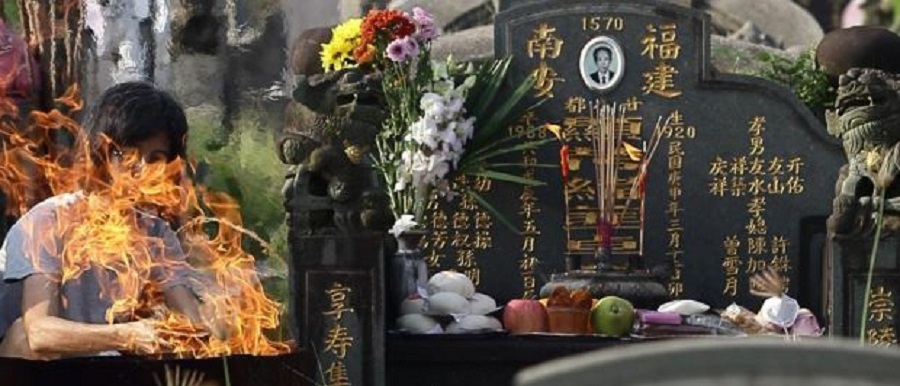
During the final part of the ceremony offers are given to the deceased.
This can be in the form of food, alcohol, paper goods or so called “ghost money” being burned as a formal offering for the afterlife of the beloved.
In return for this it is believed that ancestors will bless their living family members and help them have a prosperous year in the temporal world.
At the end of the entire ceremony all the family members gather around the tomb and throw up coloured papers in the air to the heaven for blessing.

Discovering China: 2023 Mid-Autumn Festival, Mooncakes and More!
Mid-Autumn Festival 🇨🇳 On the 15th day of the 8th month of the Chinese lunar calendar is the Mid-Autumn Festival in China. Learn about it with our Blog!
Tomb Sweeping Festival | Tomb Sweeping
Sweeping tombs is the most important activity of the festival.
Clean up the tombs and pay hommage to the deceased with offerings are two very important aspects of the celebration, to commemorate the past and the ancestors. Weed is plucked out around the tomb and fresh earth is added to take care of the area.
The deceased’s favourite dishes and wine are brought to their tombs as offerings, as well as fake money. All of it is burned in hope they have enough money and food in the after-life.
Nowadays, because cremation became more common, the Qingming traditions are simpler in big cities.
Usually, only flowers are offered to the deceased. No matter the traditions left, prayers are always recited.
Tomb Sweeping Festival | Family Outings
Qingming is not only a day to commemorate ancestors, but also to have fun and go out as a family.
In March, temperatures become warmer, the sun is out, very few rainy days – it’s the perfect moment to go out in nature and enjoy some time off.
This tradition came during the Tang Dynasty (618-907) and stayed until today, and became a very touristic period of the year.

500+ Chinese Vocabulary 📚Your Complete List
Chinese Vocabulary: Food, Shopping, Colors, Numbers, Sports and MORE! Learn from over 50 categories of Chinese Vocabulary to get by in China.
Tomb Sweeping Festival | Flying Kites
Flying kites is a very popular activity during 清明节.
We can see many of them in the sky during the day, but also at night ! Small lanterns are attached to the kite, up in the sky at night they look like stars, which is a very nice sight.
What’s even more special with flying kites, is that people cut the thread linked to the kite to let them fly freely.
It is said to bring luck and cure diseases.
Chinese Qingming Festival 2.0
In the modern version of this rite a big emphasis is given to the material aspects of the ceremony: paper made goods in the form of cars, smart-phones, tablets and other technological gadgets are especially been made for this occasion while wealth and luck is asked in return.
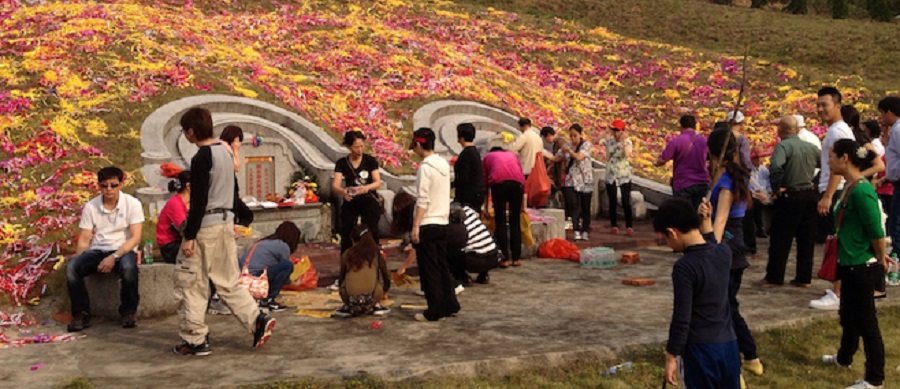
Furthermore, people that live too far from their ancestors tombs are now able to send flowers, candles or food through the internet.
In fact special websites have been created for this festival addressed as “internet memorials”.
All that must be done is select the items and make an online payment to the website for delivering the goods.
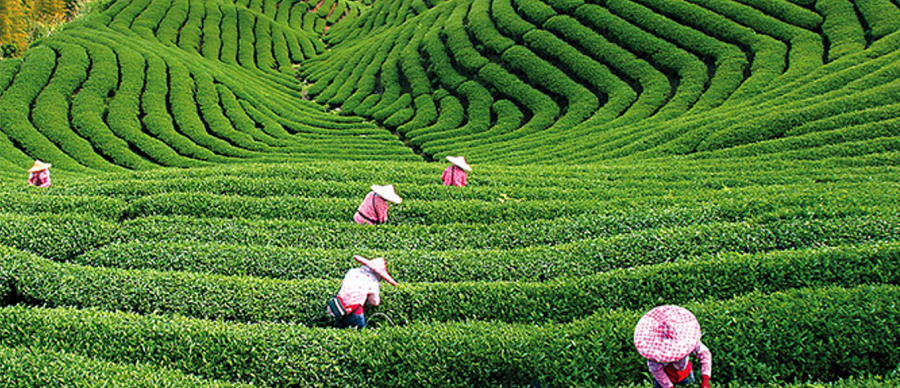
This convenient method to honour Qīngmíng jié has been encouraged by local authorities because it is considered eco-friendly and also reduces the risk of accidental fires during ceremonies.
Anyway this festival is not only a day for remembering and honouring the departed, but also a day to be spent with family outdoors or traveling in the flourishing colors of the spring after a long and gray winter.
Although speaking of colors, it’s recommended that you avoid bright colours as this could be seen as too garish. You also might want to avoid showing too much skin or wearing too much black, as this is believed to be enticing to ghosts – yikes!
Instead, your best bet is someting modest and muted.
What have your experiences of Tomb Sweeping Festival been like? Let us know in the comments!
Tomb Sweeping Festival // FAQ’s
When is Tomb Sweeping Festival?
Every year on the 15th day after the Spring Equinox, in 2024 this falls on Thursday April 4th.
When is Tomb Sweeping Day 2024?
April 4th 2024.
What is Tomb Sweeping Festival?
Chinese people celebrate 清明节 (qīngmíng jié) “Tomb Sweeping Festival”, which is a day in which Chinese people pay respect to their ancestors.
What are the Chinese characters for Qingming Jie?
The characters for Qing Ming Jie are 清明节.
What do people do on Tomb Sweeping Day?
In order to observe 清明节 (qīngmíng jié) Chinese people go to the cemetery to honour, remember and celebrate the memory of their dead relatives and ancestors.
Want more from LTL?
Want to learn Chinese from the comfort of your own home? Then our 24/7 online Chinese lessons might be the thing for you.
We offer a 7 day free trial to all new online students where you can study Mandarin 24/7.
Come and check it out free of charge and see what you think!
If you wish to hear more from LTL Language School why not join our mailing list?








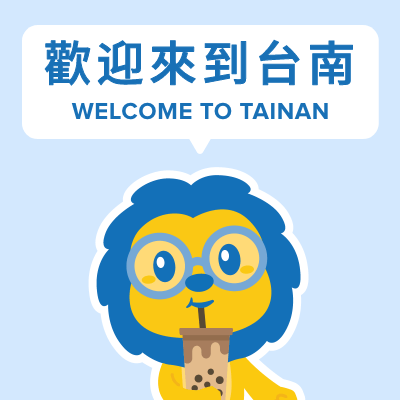

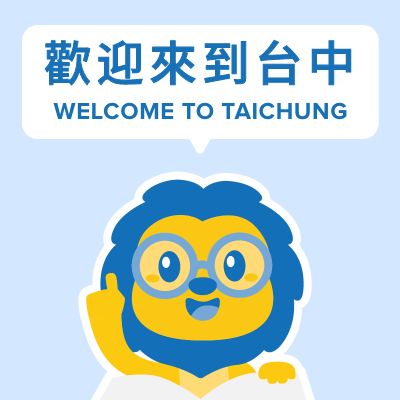



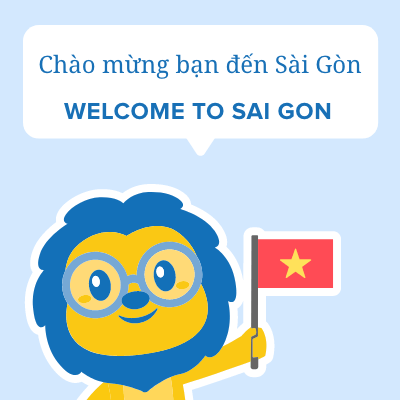


 Hi, my name is Manuel! I am from Spain and I am a Student Advisor at LTL and I’m based at our Taipei school.
Hi, my name is Manuel! I am from Spain and I am a Student Advisor at LTL and I’m based at our Taipei school. Hi, my name is Mojca! I am from Slovenia in Europe and I work as a student advisor at our Shanghai school.
Hi, my name is Mojca! I am from Slovenia in Europe and I work as a student advisor at our Shanghai school.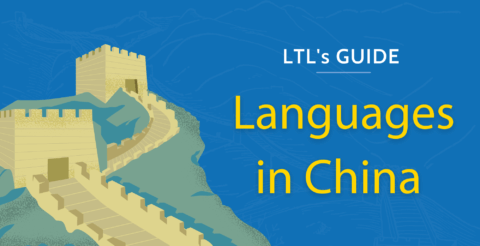


2 comments
[…] Zǔ líng zhī liú (Where The Ancestors’ Souls Gathered). It described how those ancestors of Taiwanese immigrated to this island and started their life. In 2000, the second album […]
[…] birthday he will amnesty the sins of all the ghosts. Thus believers worship him for redeeming the souls of their family who has passed away from […]